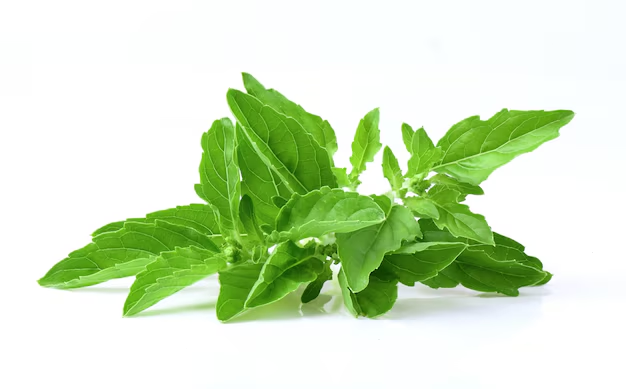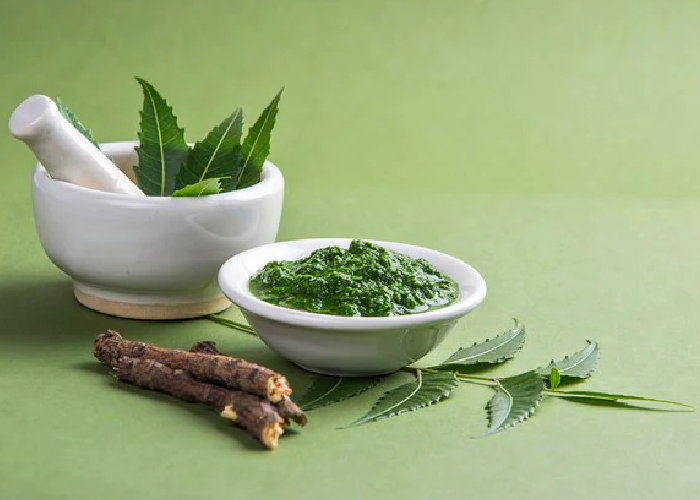Tulsi or Holy Basil is a powerful Ayurvedic herb that offers a wide range of health benefits. It is especially great for productive cough with lots of mucous in kids. If you’re looking for a natural, gentle way to soothe your child’s cough, this is the perfect solution. How to Use Tulsi? You can have it in these forms: Tulsi Cough Drops: A simple and easy way for kids to enjoy Tulsi. These drops taste good and are suitable for both dry and wet coughs. Tulsi Tea: Ayurvedic Tulsi tea for cough relief is a great alternative for older children. A few fresh Basil leaves boiled in water, indeed, make for soothing tea! Furthermore, add a bit of honey for a comforting beverage that can effectively soothe coughs and sore throats. Tulsi Syrup: Boiling Tulsi leaves until the water reduces by half gives you concentrated Tulsi syrup. Adding honey and ginger syrup, makes it a potent cough remedy that not only soothes the throat but also relieves symptoms of cough and sore throat. They are all easy to make. But when it comes to kids, I would recommend giving this cough drops. Tulsi cough drop recipe During my childhood, I don’t have any memory of going to a hospital to treat a fever or a cold. My father, who was an Ayurvedic doctor never allowed that. Instead, he’d treat my illness with herbal drinks and cough drops with herbs like Tulsi and Ajwain leaves. It always worked! You can make this cough drop easily, for example, with ingredients commonly found in the kitchen. Ingredients: Tulsi leaves juice from 2-3 leaves Honey – 2 tsp Organic turmeric powder – quarter pinch Half a pinch long pepper Black pepper/Long pepper – quarter pinch How to prepare: Mix the ingredients to prepare the cough drop. You can give 5 ml of this to your child, 2-3 times a day. However, discontinue its use after 2 weeks as all the ingredients are hot (Ushna) in nature. The ideal type for this recipe is Krishna Tulsi. If you don’t get it, you can use normal one. But it is far less effective. Tulsi for Cold and Cough Relief in Kids When children are up with a cold, parents are often reluctant to give them over-the-counter medicines, considering their side effects. This is where it comes in as a natural aid. In India, Tulsi is not just a herb; it’s considered a sacred plant. But beyond the spiritual significance, Tulsi’s amazing medicinal properties make it a go-to remedy for common respiratory issues, especially for children. Instead of just suppressing the symptoms, it helps treat the issue. The active compounds in it, such as eugenol and camphene, help open airways, reduce inflammation and fight off infections, all while being gentle on your child’s system. Benefits for Cough and Cold in Ayurveda Most homes in India have at least one Tulsi plant. I have also planted some in my balcony. This powerful herb is a whole package with loads of benefits for your overall health. It has been used for centuries to enhance overall well-being. It plays a significant role in treating basic respiratory conditions, such as coughs and colds. Here are some key benefits: A Natural Cough Suppressant: As an anti-inflammatory, antifungal, and antimicrobial agent, Tulsi is a perfect natural cough suppressant. It soothes the throat and reduces the intensity of the cough. Immune-Boosting Properties: It strengthens the immune system and helps prevent infections, offering long-lasting relief. Respiratory Problems: It reduces mucus and also, it acts as a natural decongestant that helps clear chest congestion, thereby making breathing easier. Relief from Sore Throat: Tulsi tea or Ayurvedic cough drops can relieve a sore throat, which often accompanies colds and flu. Read this blog to learn more health benefits of Tulsi. Have you ever experienced the power of Tulsi? Tell us in the comments! If you are struggling with any health issues, you can either book a consultation with us or send us a message via WhatsApp to +91 79074 89839. We have the best Ayurvedic doctors in Trivandrum who are always glad to help you. If you have any queries, contact us. You can also visit us at our hospital.
Tulsi Cough Drop for Kids – An Ayurvedic Recipe



